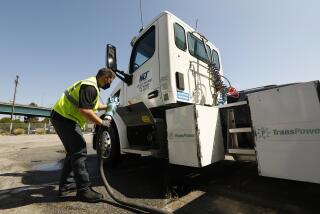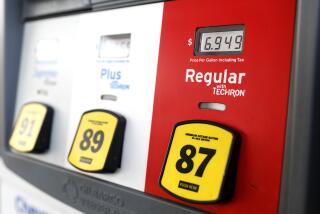Firms investing to fuel demand for natural gas vehicles
Texas billionaire T. Boone Pickens thinks his long bet on natural gas is finally paying off.
The legendary oilman has long declared it his mission to wean America off its addiction to foreign oil. He co-founded an Orange County company that builds natural gas stations around the country and sank billions into wind turbines.
Pickens’ gambles have not always paid off. He lost an estimated $150 million of his personal fortune in wind farming, and admits that he was a couple of decades early into natural gas.
But he thinks the time has come for natural gas to shake up the energy industry.
“You’re at a tipping point now,” said Pickens, who struck it big in oil and became a household name as a corporate raider in the 1980s. “Natural gas is 75% cheaper than oil. It’s cheap, clean, abundant and domestic.”
He’s confident because the economics now make sense for natural gas. The fracking revolution that has unearthed a bounty of oil within the U.S. also uncovered vast stores of natural gas. Over the last two years, its price at the pump has hovered from $1.50 to $2 per equivalent gallon below the price of diesel, according to the U.S. Energy Information Administration.
Vast stores of natural gas in shale formations such as the Eagle Ford in Texas will push production up 56% in 2040 from 2012, and it will eventually replace coal as the largest source of electricity in the state by 2035, according to one report from the energy agency. In contrast, crude oil production is forecast to rise until 2016 and drop off after 2020.
That’s good for investors who have poured money into the natural gas industry.
Pickens predicts that Clean Energy Fuels Corp., the Newport Beach company he co-founded in 1997, may turn a profit for the first time next year. Other companies such as Royal Dutch Shell and Advance Fuel Systems Corp., which are also building natural gas dispensers around the country, may also enjoy a boost.
Corporate America is also jumping in — both in converting their trucking fleets to natural gas and building fueling stations.
About 135,000 natural gas vehicles are on the road in the U.S., up from about 120,000 in 2012 and 118,000 in 2011, according to Natural Gas Vehicles for America, a trade group. The U.S. still has a long way to go before it catches up with nations that have more readily embraced the fuel. Countries such as Argentina, India and Iran each boast more than 1 million natural-gas powered vehicles on the road.
Frito-Lay North America Inc., Proctor & Gamble Co. and United Parcel Service Inc. are among the companies expanding their natural gas fleets. Trucking companies such as Ryder System Inc. are increasing their number of natural gas vehicles as well, while energy firms are busily building up the infrastructure for natural gas in the U.S.
Home improvement chain Lowe’s Cos. got into natural gas in 2012, initially running natural gas trucks on a few routes in California, Texas and Florida, said Steve Palmer, the company’s vice president of transportation. In October 2013, the company launched its first dedicated natural gas fleet at a distribution center in Mount Vernon, Texas. There are plans underway to switch its trucks to natural gas at all 15 regional distribution centers by 2017.
Palmer said it’s a proactive measure against volatile energy markets.
“We will save a little bit in the short run compared to diesel,” he said. “We think it’s a strategy to help control fuel costs over time.”
Breakthroughs in engine technology enable natural gas trucks to haul bigger loads over longer distances with fewer stops to fuel up.
“Technology has made natural gas a real game changer,” said Richard Kolodziej, president of NGVAmerica. “There has been increased use in residential, industrial and power generation. But we are seeing the most rapid growth in natural gas use in vehicles.”
“A lot of companies are looking for green answers,” Kolodziej said, “but it would be difficult to go into these directions if it didn’t make economic sense.” Tax credits that cover fuel and investment in gas stations have also helped spur adoption.
Despite the potential savings compared with gasoline, the fuel has yet to catch on among makers of consumer vehicles.
U.S. automakers are hesitant to roll out natural gas passenger cars, which typically have smaller trunks to make room for the bigger compressed natural gas tanks. Consumers also worry about the availability of stations to fill up. Among major automakers, only Honda offers a natural gas powered car in the U.S. — a version of the Civic compact sedan.
Most natural gas vehicles are targeted for the commercial market, such as garbage trucks and cargo vans. The Los Angeles County Metropolitan Transportation Authority retired the last of its diesel buses in 2011 and today runs the largest fleet of natural gas buses in the country.
The biggest roadblock for the transpiration industry has been the lack of fuel stations along America’s biggest highways. But that is starting to change as energy companies build up a network for stations at truck stops around the country.
Pickens’ Clean Energy Fuels is one of the biggest players in this field.
He, along with Chief Executive Andrew Littlefair, is aiming to build “America’s natural gas highway.” The publicly traded company already has one natural gas plant in California. It has built nearly 500 fuel stations around the country, up from about 250 in 2011.
“All we had to do was hang in there and just keep grinding,” Pickens said. Shares of Clean Energy fell 10 cents Thursday to $12.78; they dropped 5.7% during 2013.
Some industry watchers aren’t so sure about the outlook for the company.
Clean Energy is essentially a gas station chain that sells a commodity with low margins, said Pavel Molchanov, an energy analyst at Raymond James Financial Inc.
“As a fuel distributor it’s going to be exceedingly difficult for this company to be profitable on a sustained basis,” Molchanov said.
Some American businesses are doing their part to build up the country’s natural gas infrastructure.
UPS, which has a fuel station in Ontario, is investing $68 million to construct 13 more in places such as Dallas and Nashville.
The package delivery company aims to help build up the country’s network of natural gas stations, said Scott Wicker, the company’s chief sustainability officer. More stations will encourage additional companies to adopt natural gas vehicles and push the prices of trucks down.
Like other companies, UPS shells out more to buy natural-gas-powered vehicles — sometimes $180,000 per truck compared with $100,000 for a diesel-powered one — and has to recoup the upfront cost over several years through fuel savings, Wicker said.
“As the momentum builds, it is certainly our hope that the scale grows and the price point for vehicles comes down,” he said. “Then it’s just a positive spiral at that point.”
Frito-Lay opened up a fueling station in Beloit, Wis., over the summer. About 20% of its tractor-trailer fleet is powered by natural gas.
Mike O’Connell, the senior director of fleet operations for Frito-Lay/PepsiCo, said the company agreed to also fuel up its trucks at three stations being built this year by energy companies, including one in Bakersfield.
O’Connell says Frito-Lay may invest more heavily in natural gas, but much of that will depend on how quickly stations pop up.
“It’s a chicken or egg situation,” he said. “Locations are popping up faster than we can keep up with in some cases.”







